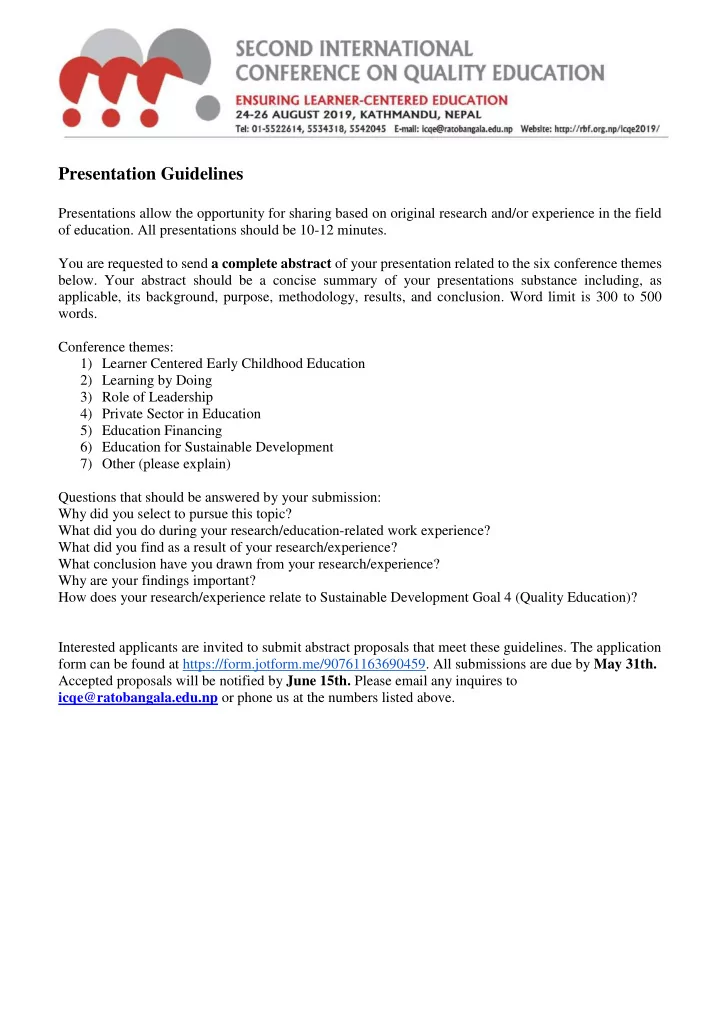

Presentation Guidelines Presentations allow the opportunity for sharing based on original research and/or experience in the field of education. All presentations should be 10-12 minutes. You are requested to send a complete abstract of your presentation related to the six conference themes below. Your abstract should be a concise summary of your presentations substance including, as applicable, its background, purpose, methodology, results, and conclusion. Word limit is 300 to 500 words. Conference themes: 1) Learner Centered Early Childhood Education 2) Learning by Doing 3) Role of Leadership 4) Private Sector in Education 5) Education Financing 6) Education for Sustainable Development 7) Other (please explain) Questions that should be answered by your submission: Why did you select to pursue this topic? What did you do during your research/education-related work experience? What did you find as a result of your research/experience? What conclusion have you drawn from your research/experience? Why are your findings important? How does your research/experience relate to Sustainable Development Goal 4 (Quality Education)? Interested applicants are invited to submit abstract proposals that meet these guidelines. The application form can be found at https://form.jotform.me/90761163690459. All submissions are due by May 31th. Accepted proposals will be notified by June 15th. Please email any inquires to icqe@ratobangala.edu.np or phone us at the numbers listed above.
Poster Guidelines Poster Presentations will be displayed for the duration of the conference in the Poster Display Area in A0 size, portrait orientation. Participants are expected to print their own poster. The poster should be in English or Nepali, and should be a visual presentation of your submitted abstract and should meet the following criteria: TITLE The title should be the same as in the submitted abstract, and included at the top of the poster in all uppercase letters. Title characters should be a minimum of 48 point font size. Your name, School or Centre should also be displayed on the poster. 48 to 60 point font size is recommended for all section headings. LETTERING The poster should include text that should be easily readable from a distance of two metres. Use UPPER and lower case for general content as all-capital text is difficult to read. Avoid using a mixture of type/font styles. CONTENT The bulk of poster text should be 24 to 32 font size with 1.5 line spacing. The text should be concise and easy to read. The message that your poster contains should be clear and understandable without the requirement of oral explanation. If relevant, methods should be presented simply and concisely. After the title, the two most important panels are the Introduction and the Conclusion, as this is the information that will attract readers and allow the presenter to engage with them. These panels need to be very simple, concise and visually attractive. Results should be presented visually if possible (graphs, charts, pictures, etc.). Avoid large tables of data, and overcrowding your poster with too many photos, graphs, and figures. Use pictures, symbols and colour. Figure legends are essential and should be short but informative. If using graphs, they should have a short heading. For visual effect, we recommend that graphs and photographs be no smaller than 12cm x 18cm. Use the space to attract your audience for discussion, not to present complex details of your methods and results. Results should be in line with those originally submitted in your abstract. No commercial or advertising content should be placed on the poster. If the poster includes any such content, it will be removed from display. Interested applicants are invited to submit poster proposals that meet these guidelines. The application form can be found at https://form.jotform.me/90761163690459. All submissions are due by May 31st. Accepted proposals will be notified by June 15th. Please email any inquires to icqe@ratobangala.edu.np or phone us at the numbers listed above.
Workshop Guidelines Workshops are designed so that attendees may engage more fully with each other on the latest data and research regarding quality education. The ultimate purpose of these workshops is to provide an interactive and exciting learning space for educators and participants can discuss and think critically about the six conference themes, while simultaneously enhancing their understanding, skills, and knowledge of what quality education means, both nationally and internationally. Workshops should be 90 minutes. Workshop proposals must include: 1. Details of workshop goals and objectives 2. The theme the workshop incorporates 3. Statement of the specific learning outcomes expected from the workshop 4. A description of the specific sequence of the activities of the workshop 5. The intended target audience 6. Seating arrangement, and materials required 7. Explanation of previous experience conducting this and other workshops 8. A resume/CV of the lead presenter Interested applicants are invited to submit workshop proposals that meet the guidelines above. The application form can be found at https://form.jotform.me/90761163690459. All submissions are due by May 31st. Accepted proposals will be notified by June 15th. Please email any inquires to icqe@ratobangala.edu.np or phone us at the numbers listed above.
Recommend
More recommend